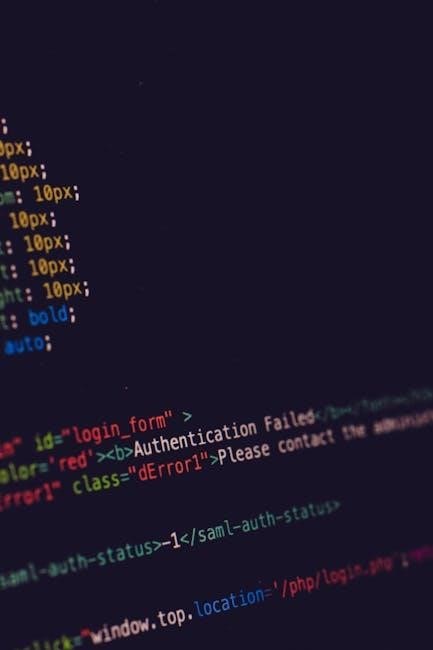ma form pc instructions

ma form pc instructions
Overview of MA Form PC Instructions
The MA Form PC Instructions guide nonprofits in Massachusetts through annual reporting requirements, ensuring compliance with state regulations․ It outlines filing processes, necessary disclosures, and record-keeping standards․
1․1 What is the MA Form PC?
The MA Form PC is an annual reporting form required by the Massachusetts Attorney General’s Office for charitable organizations․ It ensures transparency by detailing financial activities, governance, and compliance with state regulations․ The form is crucial for nonprofits operating in Massachusetts, providing a standardized method to disclose revenue, expenses, and program-related information․ Accuracy is essential to maintain compliance and public trust․
1․2 Purpose of the Form PC
The MA Form PC ensures transparency and accountability among charitable organizations in Massachusetts․ Its purpose is to provide detailed financial and operational information, enabling the public and regulators to assess compliance with state laws․ The form helps maintain trust by disclosing activities, governance, and financial health, ensuring nonprofits operate responsibly and ethically․ It also aids in oversight by the Attorney General’s Office․

Eligibility Criteria for Filing MA Form PC
Nonprofits and charitable organizations conducting business in Massachusetts must file MA Form PC annually, except those filing Federal Form 990 or other specific exempt forms․
2․1 Who Needs to File the Form PC?
All charitable organizations, nonprofits, and trusts operating in Massachusetts must file Form PC annually․ This includes entities soliciting donations or conducting business in the state․ Exceptions apply to those filing Federal Form 990 or other specified exempt forms, as outlined in the regulations․
2․2 Exceptions and Exemptions
Certain organizations are exempt from filing Form PC, including those filing Federal Form 990, 990EZ, or 990PF with the IRS, or a probate account with the court․ Religious institutions and government entities may also qualify for exemptions․ Specific criteria for exemptions are detailed in the official MA Form PC Instructions to ensure compliance and avoid unnecessary filings․

Filing Requirements for MA Form PC
The MA Form PC requires nonprofits to submit annual reports, including financial disclosures and governance policies․ Filing must be done online or by mail, adhering to specified deadlines․
3․1 Deadlines and Timelines
Nonprofits in Massachusetts must file Form PC annually, with deadlines typically 5 months after the close of their fiscal year․ Extensions may be requested for up to 6 months under specific circumstances․ Organizations must ensure timely submission to avoid penalties, as late filings can result in enforcement actions by the Massachusetts Attorney General’s Office․ Proper planning is essential to meet these strict timelines․
3․2 Required Documents and Attachments
Filing the MA Form PC requires attaching specific documents, including audited financial statements, governance policies, and a list of board directors․ Organizations must also provide detailed disclosures about fundraising activities, expenses, and governance practices․ Additionally, nonprofits that file IRS Form 990 must attach it to their Form PC submission․ Accuracy and completeness are critical to ensure compliance with Massachusetts regulations․
Preparing for MA Form PC Submission
Organizations must review requirements, gather financial data, and ensure accuracy in disclosures․ Prepare supporting documents and verify compliance with state regulations before submission․
4․1 Gathering Necessary Information
Organizations must compile financial statements, charitable contribution details, and governance documents․ Ensure accuracy in identifying donors, expenses, and program specifics․ Review prior filings for consistency and collect any additional required data․
4․2 Calculating Financial Disclosures
Accurately calculate total revenue, expenses, assets, and liabilities․ Ensure compliance with accounting standards and state-specific requirements․ Include contributions, grants, program expenses, and administrative costs․ Verify consistency with financial statements and prior filings․ Consult professionals if uncertain about classifications or calculations to ensure accuracy and compliance with regulatory expectations․ Double-check for consistency and avoid common errors․
Submission Methods for MA Form PC
Submit Form PC online through the Massachusetts Attorney General’s portal or by mail․ Ensure timely delivery and receipt confirmation for compliance with state filing requirements․
5․1 Online Submission Process
The online submission process for MA Form PC is convenient and efficient․ Filers can access the Massachusetts Attorney General’s online portal, create an account, and upload required documents․ The system guides users through each step, ensuring accuracy․ Upon successful submission, an electronic confirmation is provided, reducing the risk of errors and ensuring compliance with state regulations promptly․
5․2 Mail Submission Guidelines
Mail submissions for MA Form PC must be sent to the Massachusetts Attorney General’s office․ Include a cover letter, completed form, and required attachments․ Use certified mail with a return receipt for tracking․ Ensure the envelope is clearly addressed to the correct department․ Proper packaging prevents loss or damage, ensuring timely processing and compliance with submission requirements․
Post-Submission Steps
After submitting MA Form PC, verify receipt through confirmation emails or tracking numbers․ Maintain detailed records of the submission and all supporting documents for compliance purposes․
6;1 Verifying Receipt of the Form
After submitting MA Form PC, confirm receipt by checking for a confirmation email or tracking number․ For online submissions, log into the portal to verify the status․ If no confirmation is received, contact the appropriate authority to ensure the form was successfully processed․ Maintaining records of submission is crucial for compliance and audit purposes․
6․2 Maintaining Records for Compliance
Maintaining accurate and organized records is essential for compliance․ Retain copies of the completed MA Form PC, supporting documents, and submission confirmations․ Keep financial statements, disclosures, and correspondence for at least 3-5 years․ Ensure records are easily accessible for audits or requests by regulatory bodies to demonstrate adherence to filing requirements and maintain transparency․

Common Mistakes to Avoid
Common mistakes include missing deadlines, incomplete submissions, and inaccurate financial disclosures․ Ensure all required fields are filled correctly and deadlines are strictly followed to avoid penalties․
7․1 Incomplete or Inaccurate Information
A common error is submitting the MA Form PC with missing or incorrect details, such as financial data, disclosures, or governance information․ Ensure all fields are accurately completed, as incomplete or inaccurate submissions can lead to delays or penalties․ Double-checking the form for completeness and accuracy before submission is essential to avoid noncompliance issues․
7․2 Missing Deadlines or Requirements
Failing to meet deadlines or omitting necessary documents can result in penalties and compliance issues․ Organizations may face penalties, lose tax-exempt status, or experience delayed processing․ Requesting extensions when needed and ensuring all required attachments are included can prevent these issues․ Careful preparation and timely submission are essential to maintain compliance and avoid negative outcomes․

Extensions and Exemptions
Extensions may be requested for valid reasons, while exemptions apply to certain organizations․ Ensure compliance by adhering to filing deadlines to avoid penalties and maintain status․
8․1 How to Request an Extension
To request an extension for filing the MA Form PC, submit a formal request outlining the reason for the delay․ Ensure the request is made before the original deadline to avoid penalties․ Include any supporting documentation if required․ The extension process is typically straightforward, but timely submission is crucial․ Visit the official website for detailed guidance on extension requests and required forms․
8․2 Qualifying for Exemptions
Exemptions from filing the MA Form PC are granted to organizations meeting specific criteria, such as certain religious or educational entities․ To qualify, organizations must demonstrate they fall under exempt categories or meet financial thresholds․ Detailed requirements are outlined in the official instructions․ Ensure all claims are supported by relevant documentation and submitted as per regulatory guidelines to avoid filing obligations․

Compliance and Audits
Compliance with MA Form PC ensures adherence to Massachusetts regulations․ Audits may occur to verify accuracy․ Organizations must maintain detailed records and ensure all disclosures are truthful to avoid penalties and ensure transparency, preparing for potential reviews and maintaining accountability․
9․1 Understanding Compliance Requirements
Compliance with MA Form PC involves adhering to state-specific regulations for charitable organizations․ It requires accurate financial disclosures, proper record-keeping, and timely submissions․ Organizations must ensure all information aligns with Massachusetts laws to avoid penalties․ Compliance also involves understanding reporting standards and maintaining transparency in operations and finances to meet regulatory expectations effectively and ensure accountability․
9․2 Preparing for Potential Audits
Preparing for audits involves maintaining accurate and detailed records, including financial statements and disclosures․ Organizations should ensure compliance with state regulations and retain all documentation supporting the information reported on Form PC․ Regular internal reviews and understanding potential audit triggers can help nonprofits in Massachusetts be ready for scrutiny, ensuring transparency and accountability in their operations․
Resources and Support
Access official guidance on Mass․gov, including detailed instructions and contact information for assistance․ Professional help is available for complex filings, ensuring accurate and timely submissions․
10․1 Official Guidance and Instructions
Official guidance for MA Form PC is available on Mass․gov, providing detailed instructions, filing checklists, and contact information for the Attorney General’s Office․ The website offers step-by-step guides, sample forms, and FAQs to assist nonprofits in understanding requirements․ Additional resources include instructional videos and updates on regulatory changes, ensuring filers stay informed and compliant․
10․2 Professional Assistance Options
For complex filings, nonprofits can seek professional assistance from certified public accountants or tax attorneys specializing in nonprofit compliance․ Consulting firms also offer tailored support, ensuring accurate submissions․ Additionally, the Massachusetts Attorney General’s Office provides resources and helpline services․ Many organizations benefit from professional guidance to navigate intricate requirements and avoid errors, ensuring full compliance with state regulations․

Frequently Asked Questions
Common questions include inquiries about filing deadlines, required documents, and eligibility criteria․ Technical issues often arise, prompting users to seek troubleshooting guidance․ Additional resources are available online․
11․1 General Inquiries About the Form
General inquiries often focus on understanding the purpose of the MA Form PC, who is required to file it, and the annual reporting process․ Users frequently ask about the form’s role in ensuring compliance with Massachusetts charity regulations․ Questions also arise regarding the types of organizations covered and the importance of accurate disclosures․ Additional details can be found in the official instructions or by contacting state authorities for clarification․
11․2 Technical Issues and Troubleshooting
Common technical issues include login problems, form submission errors, or compatibility with browsers․ Users may encounter difficulties when uploading documents or navigating the online portal․ Troubleshooting steps include clearing cache, using supported browsers, or checking internet connectivity․ For unresolved issues, contacting the Massachusetts support team or consulting the official troubleshooting guide is recommended to ensure smooth filing․
Future Updates and Changes
Stay informed about regulatory updates and modifications to MA Form PC through official notifications․ Updates may include new requirements or minor form changes, ensuring compliance with evolving state regulations․
12․1 Staying Informed About Regulatory Changes
Regularly check the Massachusetts Attorney General’s website for updates to Form PC instructions․ Subscribe to newsletters or alerts for timely notifications on regulatory modifications․ Monitoring official sources ensures compliance with the latest requirements and avoids penalties․
12․2 Adapting to New Requirements
Nonprofits must review updated guidelines and adjust their reporting practices accordingly․ Understanding changes in disclosure requirements, filing deadlines, and document submissions is crucial․ Organizations should update internal processes and train staff to ensure compliance with new regulations, avoiding potential penalties and maintaining good standing with the Massachusetts Attorney General’s office․